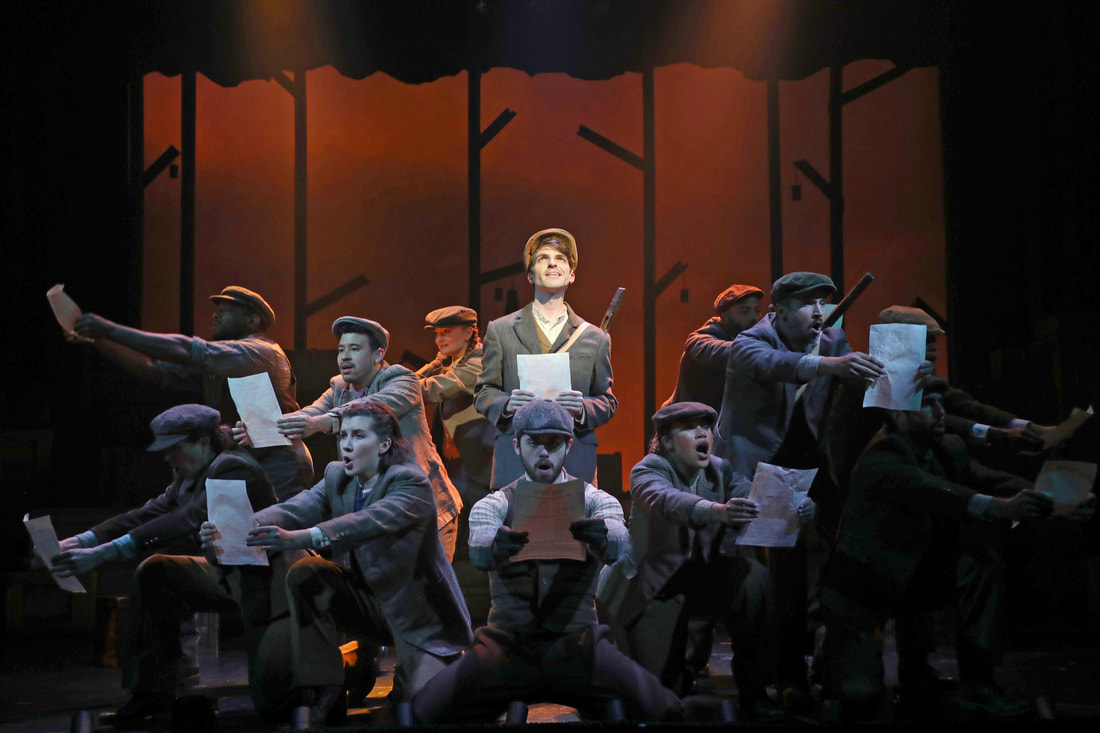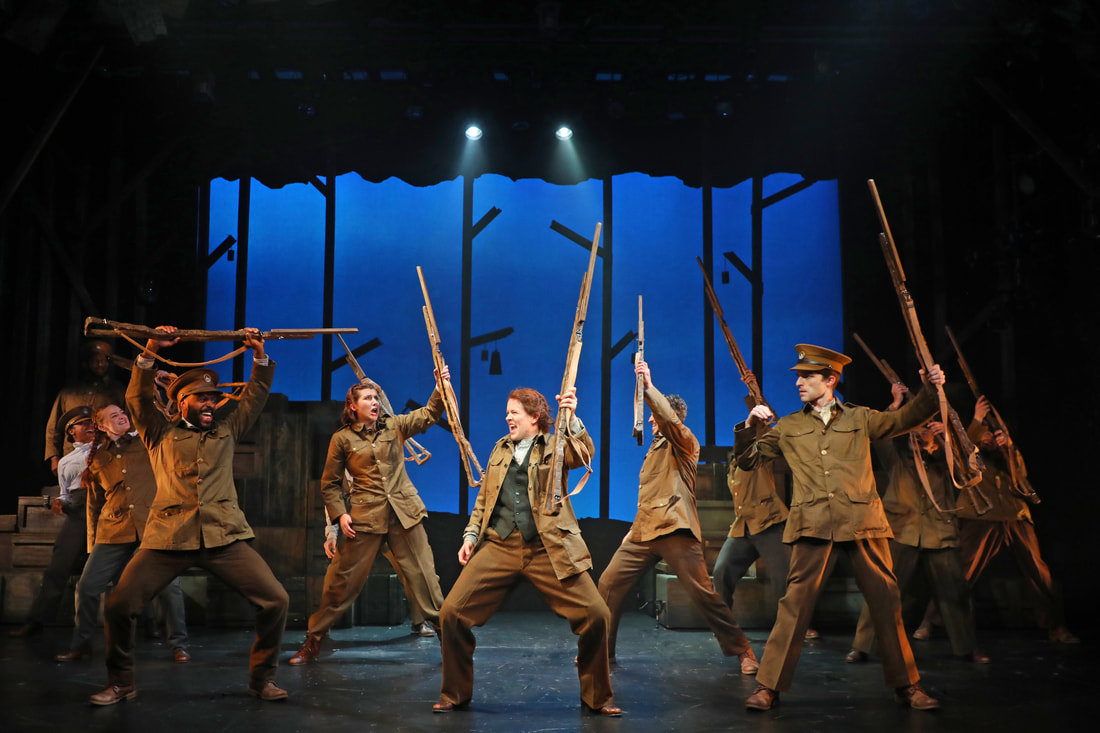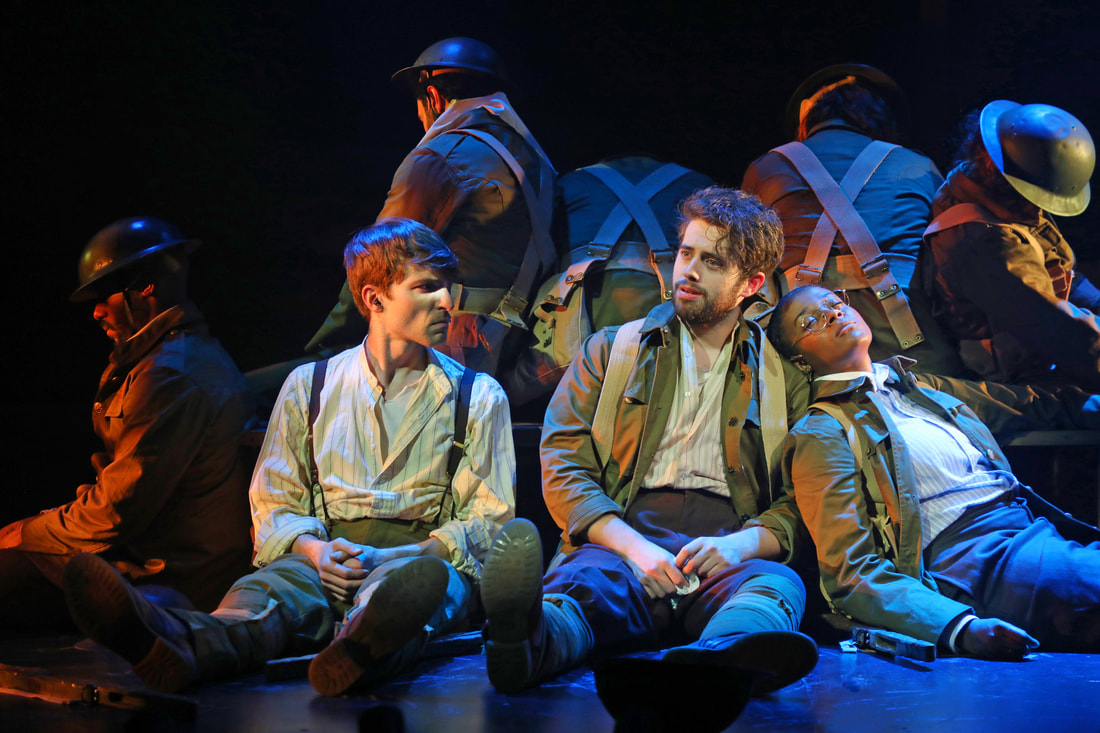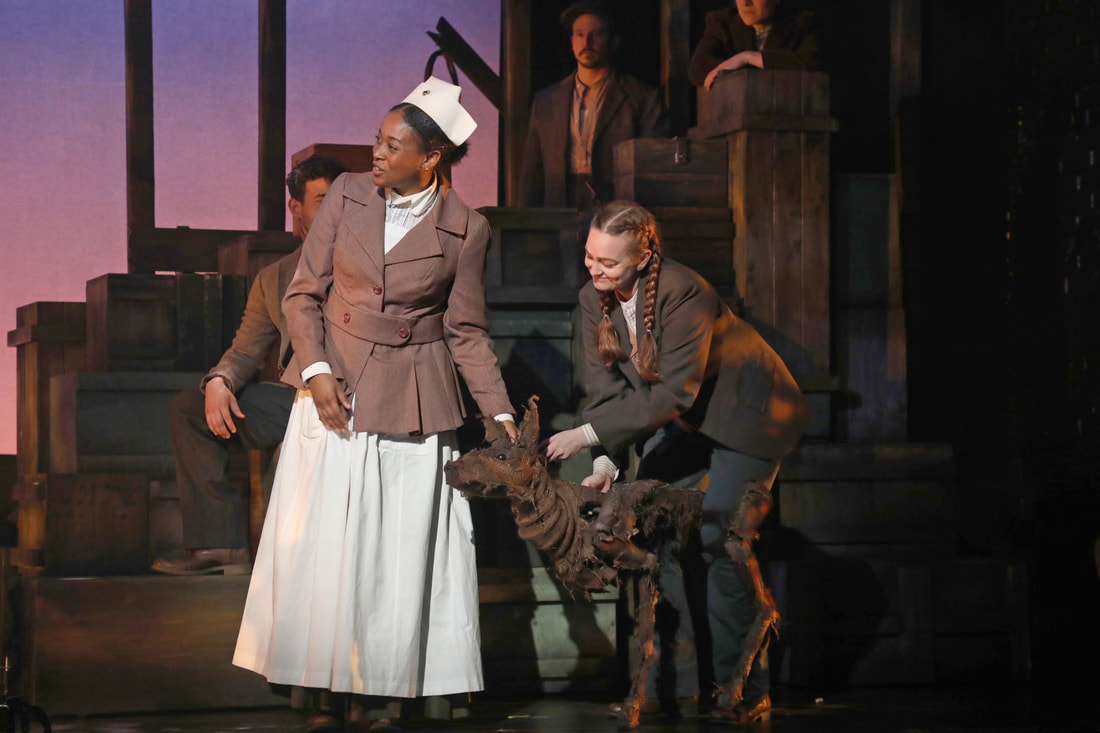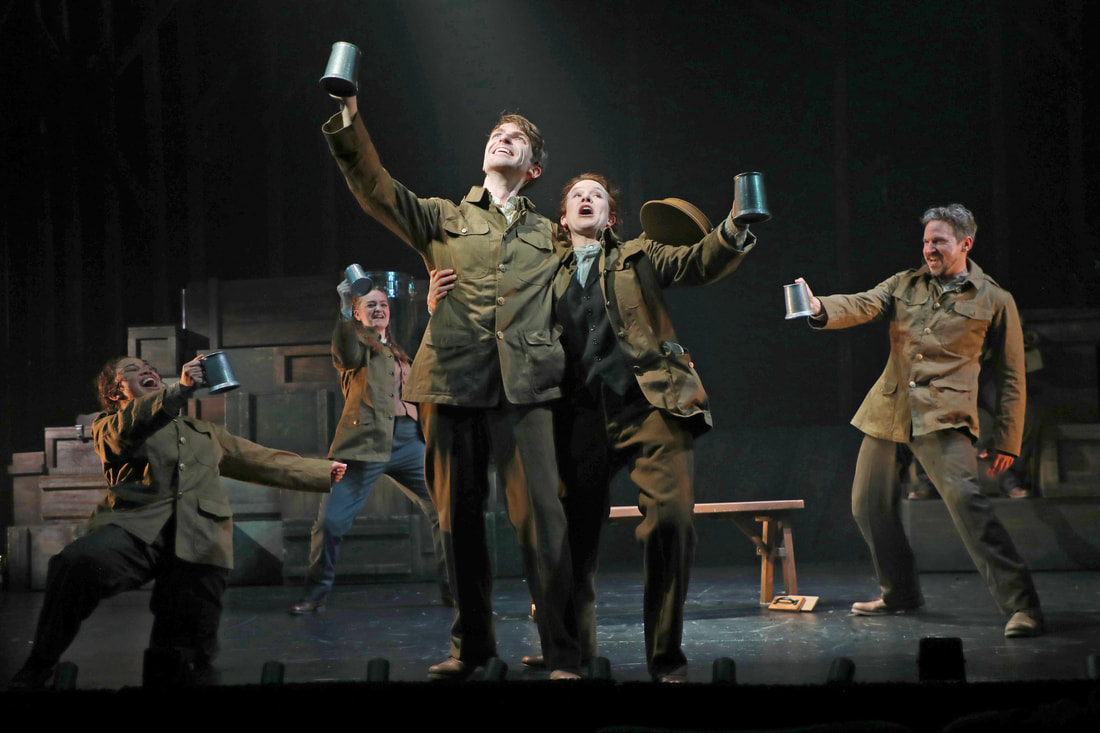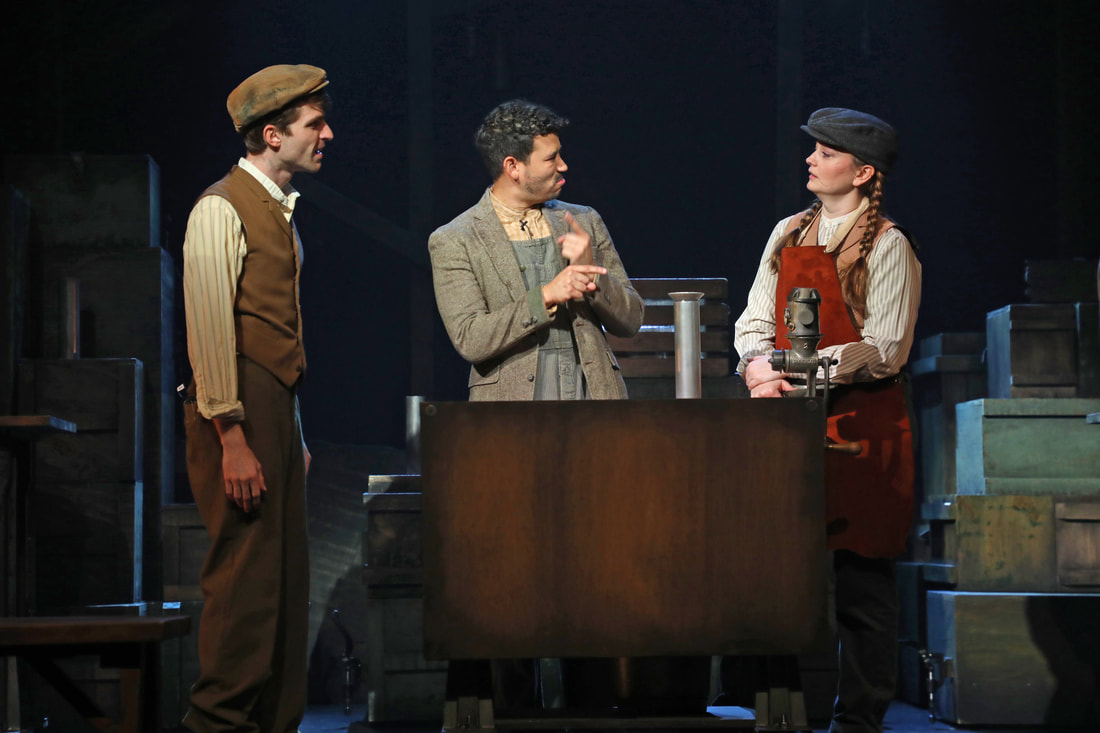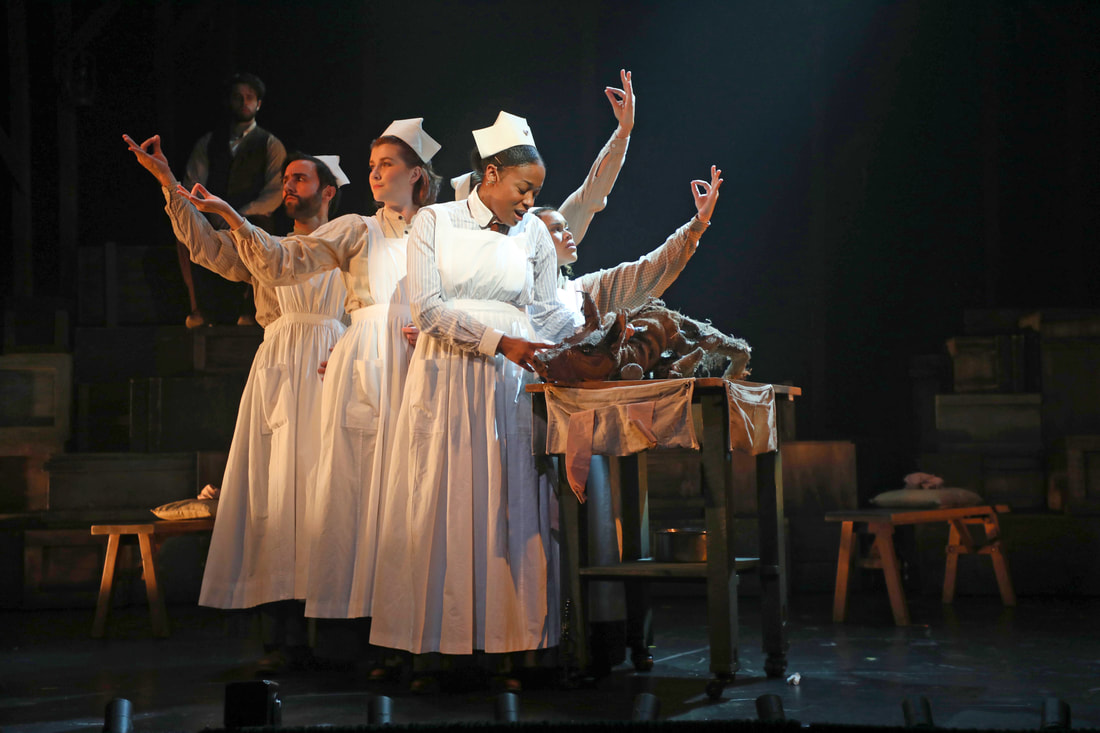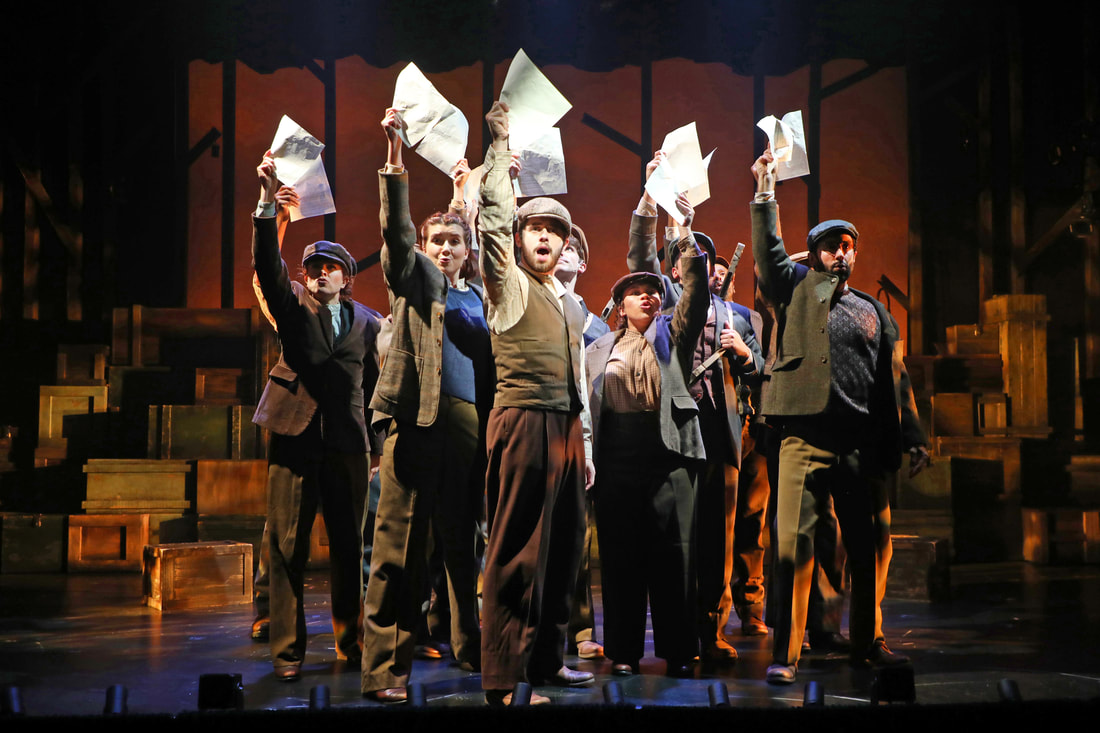EXPLORE PERSEVERANCE, DETERMINATION, AND HUMANITY IN GOODSPEED'S LATEST NEW MUSICAL, PRIVATE JONES
By Kiersten Bjork (November 1, 2023)
Private Jones is the latest new musical playing at Goodspeed’s Terris Theatre in Chester. Written and directed by Marshall Pailet and with music direction by Myrna Conn, Private Jones tells the story of a young Deaf man, Gomer Jones, and his journey from sharpshooting farmer in Brecon, Wales, to an ace sniper at the edge of No Man’s Land during World War I. We follow Jones from Brecon to basic training, then on to the Western Front, all the while facing immense odds as he tries to keep his hearing loss a secret, lest he be discharged from the service. His dream has been to become a member of the South Wales Borderers, and if he can’t have that, then what else is there?
Private Jones is a fascinating tale, one that is inspired by a (probably) true story, according to Pailet and Alexandra Wailes, director of artistic sign language for the production. It’s a narrative of perseverance and determination, passion and heartbreak, humanity and understanding. It’s a war story like many we’ve seen before, with casualties, horrors, and moments of salvation, but it is also so much more than that. It’s presented in a strikingly beautiful way, which isn’t something I would have expected from a musical set in the middle of the fighting during World War I. The direction from Pailet and Wailes and choreography by Misha Shields, mixed with the design elements, creates a stunning visual world that you feel as an audience member. The live Foley sound is a real treat, building a living, breathing soundscape that elevates the performance to another level. When combined with the visual artistry of the sign language incorporated throughout the piece, it all creates a really stunning production.
Private Jones is the latest new musical playing at Goodspeed’s Terris Theatre in Chester. Written and directed by Marshall Pailet and with music direction by Myrna Conn, Private Jones tells the story of a young Deaf man, Gomer Jones, and his journey from sharpshooting farmer in Brecon, Wales, to an ace sniper at the edge of No Man’s Land during World War I. We follow Jones from Brecon to basic training, then on to the Western Front, all the while facing immense odds as he tries to keep his hearing loss a secret, lest he be discharged from the service. His dream has been to become a member of the South Wales Borderers, and if he can’t have that, then what else is there?
Private Jones is a fascinating tale, one that is inspired by a (probably) true story, according to Pailet and Alexandra Wailes, director of artistic sign language for the production. It’s a narrative of perseverance and determination, passion and heartbreak, humanity and understanding. It’s a war story like many we’ve seen before, with casualties, horrors, and moments of salvation, but it is also so much more than that. It’s presented in a strikingly beautiful way, which isn’t something I would have expected from a musical set in the middle of the fighting during World War I. The direction from Pailet and Wailes and choreography by Misha Shields, mixed with the design elements, creates a stunning visual world that you feel as an audience member. The live Foley sound is a real treat, building a living, breathing soundscape that elevates the performance to another level. When combined with the visual artistry of the sign language incorporated throughout the piece, it all creates a really stunning production.
Private Gomer Jones himself is played by Johnny Link, who is mesmerizing in the role. His performance is controlled and focused – Jones is a marksman, after all, grounded in a fierce determination – and yet there is also an endearing quality to him. I loved the early scenes between Jones and Gwenolyn, played by Leanne Antonio. Their dynamic was fun to watch, their banter well-written and amusing. Jones’ arc as he shifts from being unable to finish the job of removing a “pest animal” from his farm to rising through the ranks as a renowned sniper in the military is really intriguing. There is a part of him that leans into the notion that “every soul’s a soul” and yet when those souls are so very far away across No Man’s Land, what do they become? Link lives within this emotional journey for Jones with impressive skill, a strong voice accompanying his acting choices.
Antonio’s Gwenolyn is lovely. She is a talented singer, shining in particular in the song “Every Soul’s a Soul.” Her relationship with Jones was one of my favorites, so much of her moments with him infused with a sense of mirth. She truly sees him, moving beyond what the average folks around him always see, and the sense of validation that Jones finds within that is wonderful. Antonio also plays Evans, a fellow soldier alongside Jones in the trenches, and is equally skilled in this role.
One of my favorite performances is that of Vincent Kempski as Edmund, another soldier that Jones crosses paths with, and one who antagonizes Jones on account of his hearing loss. Kempski is a stunning storyteller. His songs, in particular “For the Boys” and “Fantasy,” were absolute masterclasses in how to tell a story and take the audience on a journey through song. “For the Boys” shows off his more humorous side and is really well executed with physical choices. “Fantasy” is gorgeous – both heartbreaking and heartwarming – telling the story of Edmund’s wife and their relationship. The audience was hanging on Kempski’s every word.
Antonio’s Gwenolyn is lovely. She is a talented singer, shining in particular in the song “Every Soul’s a Soul.” Her relationship with Jones was one of my favorites, so much of her moments with him infused with a sense of mirth. She truly sees him, moving beyond what the average folks around him always see, and the sense of validation that Jones finds within that is wonderful. Antonio also plays Evans, a fellow soldier alongside Jones in the trenches, and is equally skilled in this role.
One of my favorite performances is that of Vincent Kempski as Edmund, another soldier that Jones crosses paths with, and one who antagonizes Jones on account of his hearing loss. Kempski is a stunning storyteller. His songs, in particular “For the Boys” and “Fantasy,” were absolute masterclasses in how to tell a story and take the audience on a journey through song. “For the Boys” shows off his more humorous side and is really well executed with physical choices. “Fantasy” is gorgeous – both heartbreaking and heartwarming – telling the story of Edmund’s wife and their relationship. The audience was hanging on Kempski’s every word.
Another knockout performance comes from Claire Neumann as King, the nephew of the drill sergeant in Jones’ training camp. Neumann is an absolute spitfire, playing the crude, rude, crass character with sass and spunk. She has a powerful presence, really leaning into gesture and movement. I enjoyed the evolution of Jones’ and King’s relationship over the course of the show, and this allowed Neumann to bring more nuance to her portrayal than just the overarching wild and explicit energy that the character exudes.
David Aron Damane plays Jones’ Father, Drill Sergeant, and Major over the course of the show. In each of the roles, Damane is solid and strong. He brings an imposing physical presence to each, as they all inhabit positions of authority in Jones’ life, and it works all around – though there is also an underlying tenderness to his performance as the Father that shines through. Bailey, another of Jones’ fellow soldiers, is played by Jon-Michael Reese. Bailey is a follower, first behind King, and then behind Jones, but a follower with sincere heart, which Reese brings through. Bailey has some good quips, and Reese handles both the humorous and somber moments with strong choices.
Jones’ hometown friend, Redvers, is played by Brandon Espinoza, who is charming from the start. Their friendship is sweet, and it was fun to see Espinoza playing into the almost brotherly relationship that they shared. The stark character shift that occurs later in the show for Redvers is handled well by Espinoza, whose later dialogue and movement carry a different sort of emotional weight to them.
Dickie Hearts plays Gwenolyn’s brother, Henry, whose deafness and knowledge of sign language results in Jones beginning to learn the language. Hearts plays the role endearingly chipper, his instruction of Jones at times quite humorous, and it was enjoyable to see the back and forth dynamic that Hearts and Link shared on stage. I was also particularly struck by the brief scene between Hearts and Link near the end of the show in which Hearts plays a German soldier. The intense emotion that Hearts conveys in those few moments makes them absolutely riveting to watch.
Private Jones is very much an ensemble piece, and this production features a hugely talented company of hearing, Deaf, and hard-of-hearing actors. In addition to the performers in named roles, the ensemble work is supported by the skilled artistry of Alex De Bard, Amelia Hensley, George Psomas, and Emily Steinhardt. I particularly enjoyed Hensley’s puppetry work. Nicholas Mahon designed the beautiful dog puppet for this show. The vocals and choreography throughout the production are impressive, the moments of group synchronization creating neat physical and visual effects.
David Aron Damane plays Jones’ Father, Drill Sergeant, and Major over the course of the show. In each of the roles, Damane is solid and strong. He brings an imposing physical presence to each, as they all inhabit positions of authority in Jones’ life, and it works all around – though there is also an underlying tenderness to his performance as the Father that shines through. Bailey, another of Jones’ fellow soldiers, is played by Jon-Michael Reese. Bailey is a follower, first behind King, and then behind Jones, but a follower with sincere heart, which Reese brings through. Bailey has some good quips, and Reese handles both the humorous and somber moments with strong choices.
Jones’ hometown friend, Redvers, is played by Brandon Espinoza, who is charming from the start. Their friendship is sweet, and it was fun to see Espinoza playing into the almost brotherly relationship that they shared. The stark character shift that occurs later in the show for Redvers is handled well by Espinoza, whose later dialogue and movement carry a different sort of emotional weight to them.
Dickie Hearts plays Gwenolyn’s brother, Henry, whose deafness and knowledge of sign language results in Jones beginning to learn the language. Hearts plays the role endearingly chipper, his instruction of Jones at times quite humorous, and it was enjoyable to see the back and forth dynamic that Hearts and Link shared on stage. I was also particularly struck by the brief scene between Hearts and Link near the end of the show in which Hearts plays a German soldier. The intense emotion that Hearts conveys in those few moments makes them absolutely riveting to watch.
Private Jones is very much an ensemble piece, and this production features a hugely talented company of hearing, Deaf, and hard-of-hearing actors. In addition to the performers in named roles, the ensemble work is supported by the skilled artistry of Alex De Bard, Amelia Hensley, George Psomas, and Emily Steinhardt. I particularly enjoyed Hensley’s puppetry work. Nicholas Mahon designed the beautiful dog puppet for this show. The vocals and choreography throughout the production are impressive, the moments of group synchronization creating neat physical and visual effects.
Scenic design by Christopher and Justin Swader seems simple, yet works perfectly for the world that this show inhabits. The set features a multitude of wooden boxes and crates with thin tree-like wooden structures against the upstage wall. The stacks of boxes are shifted and rearranged to create hills, trenches, barracks, and more, all effectively framing the scenes in a believable setting. Lighting designer Jen Schriever creates a variety of cool looks using the upstage cyc. The colorful cyc lights provide rich backdrops for the scenes, and the spotlight and highlighted moments make the story pop. I particularly liked the use of flashlights at different points throughout the show.
Costumes by designer Phuong Nguyen are practical, many of the looks based around military uniforms. I enjoyed the use of the hat transition to help signify Jones’ journey into the service – a special moment dedicated to putting on his military cap for training, and then the transition to the helmet once he moves into active service.
Sound designer Jay Hilton finds a good balance between the live orchestra and the vocals. There is so much wonderful sound work in this production due to the live Foley. From fluttering umbrellas standing in for bird wings, to drums for gunshots and a cowbell for bullets hitting a metal can, the live Foley really makes this production something special.
Costumes by designer Phuong Nguyen are practical, many of the looks based around military uniforms. I enjoyed the use of the hat transition to help signify Jones’ journey into the service – a special moment dedicated to putting on his military cap for training, and then the transition to the helmet once he moves into active service.
Sound designer Jay Hilton finds a good balance between the live orchestra and the vocals. There is so much wonderful sound work in this production due to the live Foley. From fluttering umbrellas standing in for bird wings, to drums for gunshots and a cowbell for bullets hitting a metal can, the live Foley really makes this production something special.
Private Jones is a truly moving show. It’s gripping, it’s evocative, and it shines a light on an untold story in a widely studied time of history. Featuring an outstanding company and a variety of really neat direction and design choices, particularly the incorporation of sign language and live Foley throughout, it’s an enjoyable production that also leaves a profound emotional impact long after you leave the theatre. It’s a story that you’ll want to take part in – Catch Private Jones at Goodspeed’s Terris Theatre before it closes on November 5!
Private Jones runs October 13-November 5 at Goodspeed’s Norma Terris Theatre in Chester, CT. The production has a runtime of approximately 2 hours and 30 minutes, including an intermission. Tickets are available through the Box Office (860.873.8668), or online at goodspeed.org/shows/private-jones. Please note that the production is recommended for ages 15 and up for strong language and depictions of war.
Kiersten Bjork is a theatremaker and reviewer (Connecticut Critics Circle) from Branford, CT.
Private Jones runs October 13-November 5 at Goodspeed’s Norma Terris Theatre in Chester, CT. The production has a runtime of approximately 2 hours and 30 minutes, including an intermission. Tickets are available through the Box Office (860.873.8668), or online at goodspeed.org/shows/private-jones. Please note that the production is recommended for ages 15 and up for strong language and depictions of war.
Kiersten Bjork is a theatremaker and reviewer (Connecticut Critics Circle) from Branford, CT.
